Brock Booher's Blog, page 2
July 4, 2018
Thirty Years of Moments
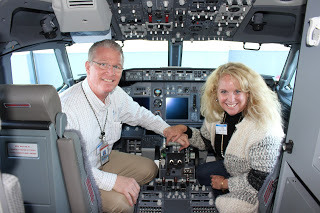
It isn’t every day you fall in love, but it can take a lifetime of days to realize how much in love you really are with someone. I have heard of love at first sight, but I have never experienced it. I imagine it feels something like I felt thirty years ago on the first day I realized I was in love with my wife.
We had been dating for a few months and spending a lot of our time together. It started casually at first—card games, study sessions, motorcycle rides, but as we grew more comfortable the spark kindled. One day we went for a drive up into the canyon. It was springtime and the snow had melted. For some reason, as we were driving she yelled, “Look at the cows!” Sure enough a herd of cows were grazing at the fence near the road. She wanted to stop and pet them. Now, being a farm boy from Kentucky, I had seen plenty of cows and had no interest in “petting” them. Her enthusiasm convinced me to stop. When I pulled over she jumped out of the car and called the cows as she approached the fence. Surprisingly, the cows responded and gathered around her. I opened my door and stood by the car with a big grin on my face while she plucked the long grass on our side of the fence and fed it to the cows giggling like a little girl.
I stood by the car with my jaded view of petting cattle and shook my head at the scene. Then it happened. Time slowed down. Sounds were muffled and in spite of being in the outdoors my vision seemed to constrict until the only thing I could see was her. In spite of the pleasant temperature, I felt suddenly flush and my heart rate quickened. It was if the whole world full of billions had dwindled down to just two people. My entire being was overwhelmed with the feeling that I loved her. Her laughter broke the trance, but after that moment I knew I was in love with her.
You can’t build a lasting relationship on a moment, but it is a good place to start. From that epiphany moment I mustered the courage to ask her to marry me. From the marriage commitment we began to build a loving relationship brick by brick. Some days I added a brick to the structure. Sadly, some days I destroyed a wall or two and had to spend time repairing the damage instead of adding to the structure.
A moment does not a marriage make. A flourish of emotion is not the same as devotion. A passing desire will never rise to the level of love. You can begin with a moment, but you must intentionally build thousands of other moments if you wish to continue building a loving relationship that will stand the test of time. Love is not just an emotion. It is a verb, a call to selfless action.
So, thirty years later I’m blessed to still be married to the girl that made me stop to pet the cows on the side of the road. It has been thirty years full of moments—sometimes loving, sometimes angry, sometimes tender, sometimes harsh, sometimes sweet, sometimes bitter. In spite of the ups and downs and the highs and the lows, I remembered that moment. And in remembering, I pressed forward in the darkness knowing that the light of love would return as long as I followed through with my promises to her.
I fell in love that day, but it has taken thirty years of loving moments for me to realize how much in love I really am.
Happy 30th Anniversary!
Published on July 04, 2018 22:20
January 9, 2018
Markito Flaquito
 I pitched the trip to my friends as a “bucket list” type of trip. Fly into San José, Costa Rica, rent dual-sport BMW touring motorcycles from Elephant Motorcycle Expeditions, and experience the country in a way that only riders can appreciate. I promised them it would be epic.
I pitched the trip to my friends as a “bucket list” type of trip. Fly into San José, Costa Rica, rent dual-sport BMW touring motorcycles from Elephant Motorcycle Expeditions, and experience the country in a way that only riders can appreciate. I promised them it would be epic.When I first mentioned the trip to my friend Mark, his eyes lit up. He is a cancer survivor who loves the adventure of the open road on a motorcycle, and Costa Rica is on his bucket list. His enthusiasm spurred me to set the trip in motion, but then a couple of months before the trip, Mark’s doctor discovered a tumor on his liver and he had to drop out to undergo chemotherapy and radiation treatment. In spite of this, he encouraged the rest of us to go and embrace the adventure. He only asked that we keep him in the loop via text and email as we traveled so he could enjoy it vicariously.
Pura vida is the national slogan of the people of Costa Rica. Literally translated it means “pure life,” but in reality it means so much more. It is an expression about how they embrace the excitement and adventure of life. It symbolizes how they feel about the goodness of the earth and everything it provides us. It represents a sense of wonder found in the natural beauty of the forests, mountains, and beaches of their land. It symbolizes gratitude for what is, and hope for what is to come.
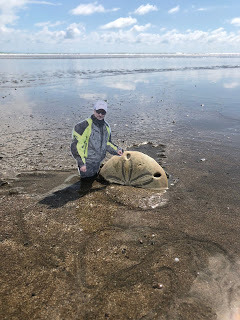 Markito Flaquito at the beachThe first night together in San José we discussed the schedule over dinner. The husbands would pick up the motorcycles and make their way through the mountains up to La Fortuna. The ladies would embark on their own adventure whitewater rafting on the Balsa River, and then we would meet at our hotel in the afternoon. In order to keep Mark involved in the fun, my wife, Britt, suggested that we fashion a photo of Mark after Flat Stanley and take pictures of him during the trip. We affectionately dubbed our traveling companion “Markito Flaquito” (little skinny Mark) and our adventure began.
Markito Flaquito at the beachThe first night together in San José we discussed the schedule over dinner. The husbands would pick up the motorcycles and make their way through the mountains up to La Fortuna. The ladies would embark on their own adventure whitewater rafting on the Balsa River, and then we would meet at our hotel in the afternoon. In order to keep Mark involved in the fun, my wife, Britt, suggested that we fashion a photo of Mark after Flat Stanley and take pictures of him during the trip. We affectionately dubbed our traveling companion “Markito Flaquito” (little skinny Mark) and our adventure began.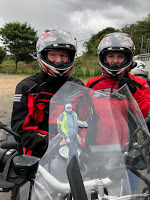 After seeing the wives off on their own adventure, we picked our way through traffic and out of the city with the help of Henry, our motorcycle guide. We traveled through Alajuela and up to the waterfall of La Paz passing fields of coffee beans and traversing misty rainforest valleys. Each sweeping turn brought another breathtaking vista and the smell of tropical flowers. Each switchback filled us with the adventure of the open road. The chatter over our headsets included a lot of “wow” in the vocabulary. We took pictures of Markito Flaquito along the way and ended the day with our wives in the hot springs behind our hotel bubbling with excitement.
After seeing the wives off on their own adventure, we picked our way through traffic and out of the city with the help of Henry, our motorcycle guide. We traveled through Alajuela and up to the waterfall of La Paz passing fields of coffee beans and traversing misty rainforest valleys. Each sweeping turn brought another breathtaking vista and the smell of tropical flowers. Each switchback filled us with the adventure of the open road. The chatter over our headsets included a lot of “wow” in the vocabulary. We took pictures of Markito Flaquito along the way and ended the day with our wives in the hot springs behind our hotel bubbling with excitement.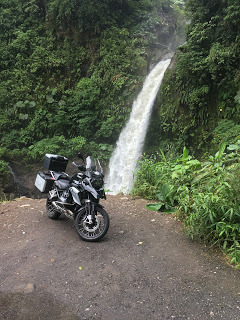 The next morning we went rappelling down waterfalls in the rainforest with Desafío Tours. We climbed on to the metal benches in the back of a truck and jostled our way up the rocky mountain road to the starting point. After a safety briefing and getting geared up, we hiked to the top of the canyon and began our rope-sliding adventure. One by one we traversed the waterfalls of the canyon dangling on ropes and scrambling through muddy pools. I was more afraid of slipping on the rocks than falling. By the time we finished the course and hiked back to the start, we were soaking wet and grinning from ear to ear.
The next morning we went rappelling down waterfalls in the rainforest with Desafío Tours. We climbed on to the metal benches in the back of a truck and jostled our way up the rocky mountain road to the starting point. After a safety briefing and getting geared up, we hiked to the top of the canyon and began our rope-sliding adventure. One by one we traversed the waterfalls of the canyon dangling on ropes and scrambling through muddy pools. I was more afraid of slipping on the rocks than falling. By the time we finished the course and hiked back to the start, we were soaking wet and grinning from ear to ear.After the ride, the ladies relaxed at the hot springs while the guys rode the north shore of Lake Arenal on Highway 142 which winds around the largest man-made lake in Costa Rica. At the end of the ride, we were meeting at the Tabacón hot springs restaurant for dinner and relaxation. Highway 142 has everything an adventure rider could want—curves, light traffic, and beautiful views. We made our way to The Macadamia Café at the northwest corner of the lake before turning around. Brian led on the way back, and with the sun going down and some water running over sections of the road, we slowed our pace on the return in spite of possibly being late for dinner.
I entered into a left-hand turn about thirty yards behind Brian focused on the road, but thinking about getting to dinner on time. By the time Brian told me that the road was slippery, I guess it was too late. The next thing I remember I was sliding across the asphalt.
My mind kicked into overdrive. How close are Greg and Scott? Far enough back not to be a problem. Was there any traffic in the other lane? No. Get away from the bike. Relax. Slide. Tumble. Stand up and get off the road. After sliding I popped up and scurried off the road as the bike slid into the muddy ditch on the opposite side of the road.
The headsets got busy. “Someone’s down! Someone’s down!” “Are you okay?” “Get your hazard lights on.” “No traffic.” “Brock are you hurt?”
“I’m okay,” I answered when I found my voice. “But my wife’s going to kill me.”
Somebody said, “Who says she has to know?”
As Greg and Scott helped me pull the bike back onto the road and cleaned the mud off, I said, “Well guys, I think this trip is over for me.”
They told me, “These bikes are pretty rugged. Let’s get it upright and I’ll bet it’s okay.”
After a quick inspection, we started it up and finished the ride to dinner. My mind raced as I replayed the accident searching for clues about why it happened. I wondered how I was going to tell my wife. I decided not to tell her until the trip was over. I didn’t want to ruin her vacation. The guys didn’t think I would make it through dinner without telling her what happened, but I focused on the fun we were having and managed to keep from spilling the beans.
I woke up in the middle of the night with my mind racing. I replayed the accident over and over again. What did I do wrong? Why did it happen? What was I doing riding motorcycles in Central America? What if I had been hurt or killed? What was I going to say when I told my wife? Should I continue riding? Fear lingered and kept me from sleeping.
Life never goes as we expect. We make plans for epic adventures and once-in-a-lifetime experiences in far away places, but the truth is that things seldom work out the way we plan them. With each day dawns a new mystery. Each moment teeming with life will develop on its own, in spite of our intentions and desires. Death looms on some unseen, and sometimes unexpected, horizon, but it is always there to remind us that our time here is finite. Yes, we should plan our future and work towards our goals, but we should make room for living, or dying, along the way. We should live a pura-vida life.
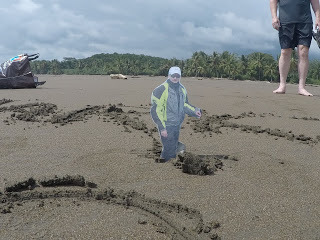
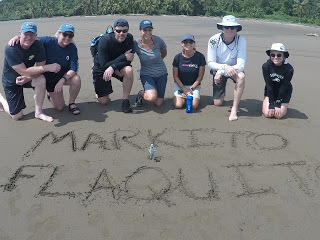
I got up early and found Scott and Greg cleaning the rest of the mud off of my bike. It was scratched up, but mechanically sound. I put my fears aside and geared up.
In addition to touring the Costa Rican countryside on motorcycles, each remaining day brought its own adventure—ziplining above the rainforest in the shadow of a volcano, watching crocodiles in the river, boogie boarding the warm surf of the Pacific, and walking along a secluded beach. Pablo, one of our drivers, even opened up his home and had us all over for dinner with his family. We snapped pictures of Markito Flaquito and sent them to our friend to lighten his spirit and let him know that we were thinking of him.
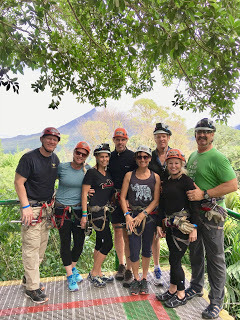
Every day of our trip was filled with adventure, friendship, and fun. Every evening was filled with good food and lively conversation. Perhaps because of the accident, or because of the calculated risks, or maybe because of our missing friend, the trip seemed full of life and longing for the excitement of the next day. We soaked it all in like the warm tropical sun at the beaches of Manuel Antonio. We relished in the beauty of nature that engulfed us. We marveled at our wonderful world as we watched the brilliant sunset over the Pacific Ocean.

On the second to last day we were gearing up for a couple’s ride and Britt noticed the scratches on the motorcycle. “Did you lay this bike down?” she asked.
I pursed my lips and took a deep breath, certain that she would be upset with me. “Yes, the other night on our way to Tabacón.” I told her the whole story and explained why I hadn’t told her. She took it all in quietly, asked a few questions, and then climbed on the back of the bike and rode with me all day.
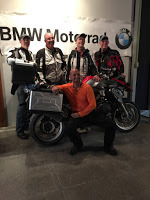 Henry, our guide, picked us up the last day and took us down the coast before turning inland for San Isidro and northbound along the mountainous Highway 2 toward San José. We stopped near the highest elevation and watched the clouds drift over the elevated rainforest. “This is a dangerous highway,” explained Henry. “In the olden days, people traveled it with oxcarts and many died along the way. They nicknamed it Cerro de la Muerte (Hill of Death).”
Henry, our guide, picked us up the last day and took us down the coast before turning inland for San Isidro and northbound along the mountainous Highway 2 toward San José. We stopped near the highest elevation and watched the clouds drift over the elevated rainforest. “This is a dangerous highway,” explained Henry. “In the olden days, people traveled it with oxcarts and many died along the way. They nicknamed it Cerro de la Muerte (Hill of Death).”We descended into San José and followed Henry through the chaotic city traffic and returned the bikes. Indeed, it was an epic, bucket-list type of trip, and I was glad that I had survived it, only losing my deductible on a rented motorcycle.
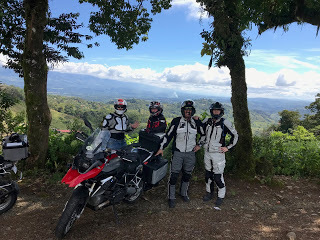
Pura vida—pure life—is a good expression to live by. Each day is a gift that we must unwrap in our own special way. Markito Flaquito reminded us to enjoy each moment and remember what a blessing it is to live. Fill every minute with a zest for life. Be grateful for the blessings and opportunities we have been given. Lift the spirits of those around you with optimism. Don’t let the certain specter of death keep you from living. Like my friend Mark, I choose to live every day with pura vida.
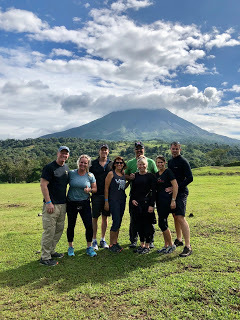
Published on January 09, 2018 07:17
June 17, 2017
Five Reasons Why Fatherhood is the Toughest Leadership Position You Will Ever Hold
Recently, I stood in front of a group of Japanese exchange students holding an index card with a question on it. “What has been your most difficult leadership position?”
The answer popped into my head almost immediately. I didn’t think of the many leadership positions I have held in my church. The stressful Air Force leadership positions I once filled didn’t cross my mind. I never even gave my titles as an airline Captain or Check Airman a thought. “The most difficult leadership position I have ever held,” I told them almost without hesitation, “Is being a father.”
Before any of you mothers out there get your dander up, I tip my hat to motherhood as well. I merely stated that being a father is the most difficult leadership role I have ever held, not that fatherhood is the most difficult leadership role out there. I have never been, and never will be, a mother. So, in answering the question, I was limited to the roles I have held. This is an expression about my experience as a father, but it certainly applies to a woman’s experience as a mother. Parenting is the most difficult leadership role in the world.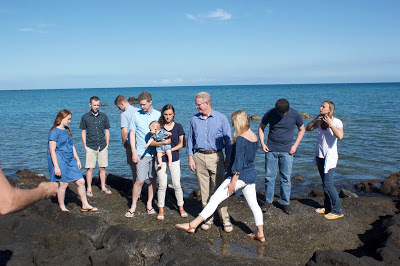 Trying to organize the family photo
Trying to organize the family photo
Leading a family is the most difficult task in the world for several reasons.
1) Your family knows where you buried the bodies. Remember that time you decided to burn the leftover boxes from Christmas in the fireplace and set off all the smoke alarms after midnight and almost burned the house down? Or how about the time you backed into a telephone pole with your minivan because you were shouting at your boys for fighting? If you have done something in front of your family that is embarrassing, shameful, or might land you in jail, your family will remember. It’s tough to lead a group of people who know how imperfect you are. You can’t pull the wool over their eyes, or pretend that you’re perfect. They know who you really are. They know where you’ve buried the dead bodies of your temper tantrums, your broken promises, your lies, and your failures. It’s tough to lead a family, because your family knows you aren’t anywhere close to perfect.
2) Your children will pick up your bad habits before they develop your good habits. Have you ever had to wash your child’s mouth out with soap because they repeated a swear word they heard you utter? Have you ever put your child in time out for behaving like you? Bad habits will always be duplicated sooner, and more often, than good habits. A child will do what you do long before they will do what you say, even if what you are telling them is better for them. You can put on a good face at work and hide or minimize your bad habits, but not at home. It’s tough to lead an organization that is quick to repeat your bad habits, and slow to develop your good habits.
3) Your children know where you sleep. Vince Lombardi said, “Fatigue makes cowards of us all.” When you have worked a long day and your toddler crawls into bed with you because he’s afraid of the dark, you find out what you are really made of. It’s tough to be brave and lead when it’s 1:00 AM and your teenager is still out on prom night and you can’t sleep even though you have to get up at 6:00 AM and go to work. Everybody can keep their cool and make good decisions when they get eight hours of uninterrupted rest. Only a parent understands the challenge of running a household full of energetic grade-school children when you’re sleep deprived, without snapping someone’s head off. Only a parent can appreciate the struggle to remain sane when you can’t remember what it’s like to sleep without someone kicking you in the kidneys all night long. Leading a family is difficult because you are constantly fighting fatigue.
4) Your children don’t know and don’t care how important you are at work. I don’t care if you are the CEO of Apple, the Rear Admiral of a Naval shipyard, or Supreme Court Justice, and neither do your children. Your children don’t care about how many lives you saved that day, or how much money you made on that big deal you closed. Your children aren’t impressed by some fancy title or corner office with windows on two sides. All your children care about is what you are going to fix for dinner and if you will let them stay up and play a game past their normal bedtime. The world may bow at your feet or shower you with accolades, but when you cross the threshold of your home the only title that matters is Daddy. To lead a family you can’t pull rank or rely on some earned status. Leading as a parent is difficult because parents have to lead in the moment without the help or trappings of authority.
5) You can’t quit from being a parent. No matter how old you get, you will always be the father of your children. There is no finish line. There is no retirement. There is no quitting. It is true that you can simply give up, or abandon, your children, but that only shifts the burden to someone else, not the responsibility. Children will look to you as a parent (good or bad) for the rest of your (and their) life. The job of a parent does evolve over time, and the task loading does wane as children grow older, but the job is never complete. Once a parent, always a parent. Parenting is not for quitters.
Yes, leading as a father is the toughest thing I have ever done, but it also the most rewarding. Your children may know of your biggest faults, but they will also love you when you don’t deserve it. Your children may pick up your bad habits, but they will also surprise you with their ingenuity and accomplishment. Your children may deprive you of sleep, but they will also reenergize you with their sense of wonder and zest for life. Your children may not respect you for your titles and accomplishments in the workplace, but they will look up to you because of (and in spite of) who you really are. You may not be able to quit being the father to your children, but why would you ever want to?
Nothing I have ever done has been as difficult as being a father, and I wouldn’t have it any other way.
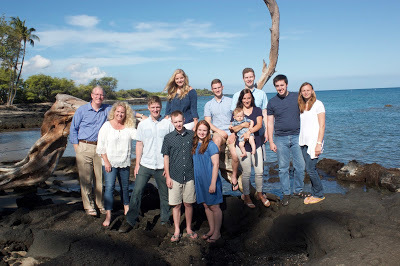 The Family Photo
The Family Photo
The answer popped into my head almost immediately. I didn’t think of the many leadership positions I have held in my church. The stressful Air Force leadership positions I once filled didn’t cross my mind. I never even gave my titles as an airline Captain or Check Airman a thought. “The most difficult leadership position I have ever held,” I told them almost without hesitation, “Is being a father.”
Before any of you mothers out there get your dander up, I tip my hat to motherhood as well. I merely stated that being a father is the most difficult leadership role I have ever held, not that fatherhood is the most difficult leadership role out there. I have never been, and never will be, a mother. So, in answering the question, I was limited to the roles I have held. This is an expression about my experience as a father, but it certainly applies to a woman’s experience as a mother. Parenting is the most difficult leadership role in the world.
 Trying to organize the family photo
Trying to organize the family photoLeading a family is the most difficult task in the world for several reasons.
1) Your family knows where you buried the bodies. Remember that time you decided to burn the leftover boxes from Christmas in the fireplace and set off all the smoke alarms after midnight and almost burned the house down? Or how about the time you backed into a telephone pole with your minivan because you were shouting at your boys for fighting? If you have done something in front of your family that is embarrassing, shameful, or might land you in jail, your family will remember. It’s tough to lead a group of people who know how imperfect you are. You can’t pull the wool over their eyes, or pretend that you’re perfect. They know who you really are. They know where you’ve buried the dead bodies of your temper tantrums, your broken promises, your lies, and your failures. It’s tough to lead a family, because your family knows you aren’t anywhere close to perfect.
2) Your children will pick up your bad habits before they develop your good habits. Have you ever had to wash your child’s mouth out with soap because they repeated a swear word they heard you utter? Have you ever put your child in time out for behaving like you? Bad habits will always be duplicated sooner, and more often, than good habits. A child will do what you do long before they will do what you say, even if what you are telling them is better for them. You can put on a good face at work and hide or minimize your bad habits, but not at home. It’s tough to lead an organization that is quick to repeat your bad habits, and slow to develop your good habits.
3) Your children know where you sleep. Vince Lombardi said, “Fatigue makes cowards of us all.” When you have worked a long day and your toddler crawls into bed with you because he’s afraid of the dark, you find out what you are really made of. It’s tough to be brave and lead when it’s 1:00 AM and your teenager is still out on prom night and you can’t sleep even though you have to get up at 6:00 AM and go to work. Everybody can keep their cool and make good decisions when they get eight hours of uninterrupted rest. Only a parent understands the challenge of running a household full of energetic grade-school children when you’re sleep deprived, without snapping someone’s head off. Only a parent can appreciate the struggle to remain sane when you can’t remember what it’s like to sleep without someone kicking you in the kidneys all night long. Leading a family is difficult because you are constantly fighting fatigue.
4) Your children don’t know and don’t care how important you are at work. I don’t care if you are the CEO of Apple, the Rear Admiral of a Naval shipyard, or Supreme Court Justice, and neither do your children. Your children don’t care about how many lives you saved that day, or how much money you made on that big deal you closed. Your children aren’t impressed by some fancy title or corner office with windows on two sides. All your children care about is what you are going to fix for dinner and if you will let them stay up and play a game past their normal bedtime. The world may bow at your feet or shower you with accolades, but when you cross the threshold of your home the only title that matters is Daddy. To lead a family you can’t pull rank or rely on some earned status. Leading as a parent is difficult because parents have to lead in the moment without the help or trappings of authority.
5) You can’t quit from being a parent. No matter how old you get, you will always be the father of your children. There is no finish line. There is no retirement. There is no quitting. It is true that you can simply give up, or abandon, your children, but that only shifts the burden to someone else, not the responsibility. Children will look to you as a parent (good or bad) for the rest of your (and their) life. The job of a parent does evolve over time, and the task loading does wane as children grow older, but the job is never complete. Once a parent, always a parent. Parenting is not for quitters.
Yes, leading as a father is the toughest thing I have ever done, but it also the most rewarding. Your children may know of your biggest faults, but they will also love you when you don’t deserve it. Your children may pick up your bad habits, but they will also surprise you with their ingenuity and accomplishment. Your children may deprive you of sleep, but they will also reenergize you with their sense of wonder and zest for life. Your children may not respect you for your titles and accomplishments in the workplace, but they will look up to you because of (and in spite of) who you really are. You may not be able to quit being the father to your children, but why would you ever want to?
Nothing I have ever done has been as difficult as being a father, and I wouldn’t have it any other way.
 The Family Photo
The Family Photo
Published on June 17, 2017 14:28
Five Reasons That Fatherhood is the Toughest Leadership Position You Will Ever Hold
Recently, I stood in front of a group of Japanese exchange students holding an index card with a question on it. “What has been your most difficult leadership position?”
The answer popped into my head almost immediately. I didn’t think of the many leadership positions I have held in my church. The stressful Air Force leadership positions I once filled didn’t cross my mind. I never even gave my titles as an airline Captain or Check Airman a thought. “The most difficult leadership position I have ever held,” I told them almost without hesitation, “Is being a father.”
Before any of you mothers out there get your dander up, I tip my hat to motherhood as well. I merely stated that being a father is the most difficult leadership role I have ever held, not that fatherhood is the most difficult leadership role out there. I have never been, and never will be, a mother. So, in answering the question, I was limited to the roles I have held. This is an expression about my experience as a father, but it certainly applies to a woman’s experience as a mother. Parenting is the most difficult leadership role in the world. Trying to organize the family photo
Trying to organize the family photo
Leading a family is the most difficult task in the world for several reasons.
1) Your family knows where you buried the bodies. Remember that time you decided to burn the leftover boxes from Christmas in the fireplace and set off all the smoke alarms after midnight and almost burned the house down? Or how about the time you backed into a telephone pole with your minivan because you were shouting at your boys for fighting? If you have done something in front of your family that is embarrassing, shameful, or might land you in jail, your family will remember. It’s tough to lead a group of people who know how imperfect you are. You can’t pull the wool over their eyes, or pretend that you’re perfect. They know who you really are. They know where you’ve buried the dead bodies of your temper tantrums, your broken promises, your lies, and your failures. It’s tough to lead a family, because your family knows you aren’t anywhere close to perfect.
2) Your children will pick up your bad habits before they develop your good habits. Have you ever had to wash your child’s mouth out with soap because they repeated a swear word they heard you utter? Have you ever put your child in time out for behaving like you? Bad habits will always be duplicated sooner, and more often, than good habits. A child will do what you do long before they will do what you say, even if what you are telling them is better for them. You can put on a good face at work and hide or minimize your bad habits, but not at home. It’s tough to lead an organization that is quick to repeat your bad habits, and slow to develop your good habits.
3) Your children know where you sleep. Vince Lombardi said, “Fatigue makes cowards of us all.” When you have worked a long day and your toddler crawls into bed with you because he’s afraid of the dark, you find out what you are really made of. It’s tough to be brave and lead when it’s 1:00 AM and your teenager is still out on prom night and you can’t sleep even though you have to get up at 6:00 AM and go to work. Everybody can keep their cool and make good decisions when they get eight hours of uninterrupted rest. Only a parent understands the challenge of running a household full of energetic grade-school children when you’re sleep deprived, without snapping someone’s head off. Only a parent can appreciate the struggle to remain sane when you can’t remember what it’s like to sleep without someone kicking you in the kidneys all night long. Leading a family is difficult because you are constantly fighting fatigue.
4) Your children don’t know and don’t care how important you are at work. I don’t care if you are the CEO of Apple, the Rear Admiral of a Naval shipyard, or Supreme Court Justice, and neither do your children. Your children don’t care about how many lives you saved that day, or how much money you made on that big deal you closed. Your children aren’t impressed by some fancy title or corner office with windows on two sides. All your children care about is what you are going to fix for dinner and if you will let them stay up and play a game past their normal bedtime. The world may bow at your feet or shower you with accolades, but when you cross the threshold of your home the only title that matters is Daddy. To lead a family you can’t pull rank or rely on some earned status. Leading as a parent is difficult because parents have to lead in the moment without the help or trappings of authority.
5) You can’t quit from being a parent. No matter how old you get, you will always be the father of your children. There is no finish line. There is no retirement. There is no quitting. It is true that you can simply give up, or abandon, your children, but that only shifts the burden to someone else, not the responsibility. Children will look to you as a parent (good or bad) for the rest of your (and their) life. The job of a parent does evolve over time, and the task loading does wane as children grow older, but the job is never complete. Once a parent, always a parent. Parenting is not for quitters.
Yes, leading as a father is the toughest thing I have ever done, but it also the most rewarding. Your children may know of your biggest faults, but they will also love you when you don’t deserve it. Your children may pick up your bad habits, but they will also surprise you with their ingenuity and accomplishment. Your children may deprive you of sleep, but they will also reenergize you with their sense of wonder and zest for life. Your children may not respect you for your titles and accomplishments in the workplace, but they will look up to you because of (and in spite of) who you really are. You may not be able to quit being the father to your children, but why would you ever want to?
Nothing I have ever done has been as difficult as being a father, and I wouldn’t have it any other way.
 The Family Photo
The Family Photo
The answer popped into my head almost immediately. I didn’t think of the many leadership positions I have held in my church. The stressful Air Force leadership positions I once filled didn’t cross my mind. I never even gave my titles as an airline Captain or Check Airman a thought. “The most difficult leadership position I have ever held,” I told them almost without hesitation, “Is being a father.”
Before any of you mothers out there get your dander up, I tip my hat to motherhood as well. I merely stated that being a father is the most difficult leadership role I have ever held, not that fatherhood is the most difficult leadership role out there. I have never been, and never will be, a mother. So, in answering the question, I was limited to the roles I have held. This is an expression about my experience as a father, but it certainly applies to a woman’s experience as a mother. Parenting is the most difficult leadership role in the world.
 Trying to organize the family photo
Trying to organize the family photoLeading a family is the most difficult task in the world for several reasons.
1) Your family knows where you buried the bodies. Remember that time you decided to burn the leftover boxes from Christmas in the fireplace and set off all the smoke alarms after midnight and almost burned the house down? Or how about the time you backed into a telephone pole with your minivan because you were shouting at your boys for fighting? If you have done something in front of your family that is embarrassing, shameful, or might land you in jail, your family will remember. It’s tough to lead a group of people who know how imperfect you are. You can’t pull the wool over their eyes, or pretend that you’re perfect. They know who you really are. They know where you’ve buried the dead bodies of your temper tantrums, your broken promises, your lies, and your failures. It’s tough to lead a family, because your family knows you aren’t anywhere close to perfect.
2) Your children will pick up your bad habits before they develop your good habits. Have you ever had to wash your child’s mouth out with soap because they repeated a swear word they heard you utter? Have you ever put your child in time out for behaving like you? Bad habits will always be duplicated sooner, and more often, than good habits. A child will do what you do long before they will do what you say, even if what you are telling them is better for them. You can put on a good face at work and hide or minimize your bad habits, but not at home. It’s tough to lead an organization that is quick to repeat your bad habits, and slow to develop your good habits.
3) Your children know where you sleep. Vince Lombardi said, “Fatigue makes cowards of us all.” When you have worked a long day and your toddler crawls into bed with you because he’s afraid of the dark, you find out what you are really made of. It’s tough to be brave and lead when it’s 1:00 AM and your teenager is still out on prom night and you can’t sleep even though you have to get up at 6:00 AM and go to work. Everybody can keep their cool and make good decisions when they get eight hours of uninterrupted rest. Only a parent understands the challenge of running a household full of energetic grade-school children when you’re sleep deprived, without snapping someone’s head off. Only a parent can appreciate the struggle to remain sane when you can’t remember what it’s like to sleep without someone kicking you in the kidneys all night long. Leading a family is difficult because you are constantly fighting fatigue.
4) Your children don’t know and don’t care how important you are at work. I don’t care if you are the CEO of Apple, the Rear Admiral of a Naval shipyard, or Supreme Court Justice, and neither do your children. Your children don’t care about how many lives you saved that day, or how much money you made on that big deal you closed. Your children aren’t impressed by some fancy title or corner office with windows on two sides. All your children care about is what you are going to fix for dinner and if you will let them stay up and play a game past their normal bedtime. The world may bow at your feet or shower you with accolades, but when you cross the threshold of your home the only title that matters is Daddy. To lead a family you can’t pull rank or rely on some earned status. Leading as a parent is difficult because parents have to lead in the moment without the help or trappings of authority.
5) You can’t quit from being a parent. No matter how old you get, you will always be the father of your children. There is no finish line. There is no retirement. There is no quitting. It is true that you can simply give up, or abandon, your children, but that only shifts the burden to someone else, not the responsibility. Children will look to you as a parent (good or bad) for the rest of your (and their) life. The job of a parent does evolve over time, and the task loading does wane as children grow older, but the job is never complete. Once a parent, always a parent. Parenting is not for quitters.
Yes, leading as a father is the toughest thing I have ever done, but it also the most rewarding. Your children may know of your biggest faults, but they will also love you when you don’t deserve it. Your children may pick up your bad habits, but they will also surprise you with their ingenuity and accomplishment. Your children may deprive you of sleep, but they will also reenergize you with their sense of wonder and zest for life. Your children may not respect you for your titles and accomplishments in the workplace, but they will look up to you because of (and in spite of) who you really are. You may not be able to quit being the father to your children, but why would you ever want to?
Nothing I have ever done has been as difficult as being a father, and I wouldn’t have it any other way.
 The Family Photo
The Family Photo
Published on June 17, 2017 14:28
April 5, 2017
Thailand: Adventure Into the Unfamiliar
 The view at the top of Tiger Cave Temple
The view at the top of Tiger Cave TempleThe sound of metal crashing against metal made my heart skip a beat. It was our last night in Thailand and I didn’t want to spend it in some urgent care, or police station, where nobody spoke English. However, I had taken a few risks on this trip and although risk can produce rewards, it can also produce injury, and incur cost.
I like to take a few risks while traveling. I’ve raced horses on the beach, whitewater rafted, rappelled down waterfalls, explored caves, ziplined above the rainforest, jumped off cliffs, boated down the Amazon (the river not the website), scuba dived shipwrecks, and swam with sharks. A bit of adventure gets the heart pumping and makes travel more memorable. Sitting by the pool or on the beach is boring. I like a little more adventure. My trip to Thailand incurred a few risks, but it was packed with once-in-lifetime adventures as well.
 At the Grand PalaceWhen my daughter suggested Thailand for her Senior trip, I must admit that I wasn’t enthusiastic about it. I couldn’t understand why anyone would want to travel that far when perfectly acceptable destinations were within a few hours of air travel. What could possibly be worth spending twenty hours in an airplane and crossing the International Date Line? She promised it would be an adventure into the unfamiliar.
At the Grand PalaceWhen my daughter suggested Thailand for her Senior trip, I must admit that I wasn’t enthusiastic about it. I couldn’t understand why anyone would want to travel that far when perfectly acceptable destinations were within a few hours of air travel. What could possibly be worth spending twenty hours in an airplane and crossing the International Date Line? She promised it would be an adventure into the unfamiliar.From the moment I stepped off the airplane onto the streets of Bangkok, I felt like I was swimming in the unfamiliar. I couldn’t speak the language. I didn’t know much about the culture. I struggled to hire a taxi. The money was strange. I had trouble finding my bearings. I was in deep water of the unfamiliar and all I could do was tread water. The streets of Bangkok enchanted me with the intoxicating smells of street vendors, the melodic sound of the Thai language, and the rhythmic movement of a city in motion. I went for a walk the first night and soaked it all in. I wanted to communicate and my brain instinctively began searching in vain through my rolodex of languages for phrases I could use, but found nothing useful. I was relegated to pointing, smiling, and hoping that I could get my point across. Just finding a place for dinner was an adventure in the unfamiliar.
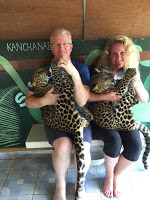
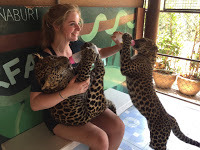
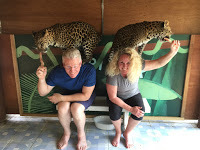 After a good night’s rest, we embarked on the first thrilling quest—feeding tigers and riding elephants. Growing up on a farm you develop a healthy respect for large animals. You learn that no matter how loyal or docile, large animals have the propensity to injure or kill you at any time. In spite of that learned respect, I found myself bottle-feeding juvenile leopards in a cage. They tugged at the bottle like baby calves I used to feed, but I couldn’t help but wonder what would happen when the bottle was empty. Of course, I found out. I fed them raw meat at the end of a rawhide bone while they sat on my lap. I was relieved to emerge from the cage with all my fingers.
After a good night’s rest, we embarked on the first thrilling quest—feeding tigers and riding elephants. Growing up on a farm you develop a healthy respect for large animals. You learn that no matter how loyal or docile, large animals have the propensity to injure or kill you at any time. In spite of that learned respect, I found myself bottle-feeding juvenile leopards in a cage. They tugged at the bottle like baby calves I used to feed, but I couldn’t help but wonder what would happen when the bottle was empty. Of course, I found out. I fed them raw meat at the end of a rawhide bone while they sat on my lap. I was relieved to emerge from the cage with all my fingers.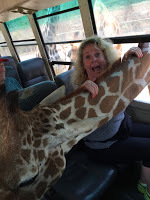 Next we boarded a safari bus with open windows and passed through areas with lions, tigers, and various other wild animals capable of eviscerating a human without breaking a sweat. I felt pretty safe, until I realized that my window was broken and wouldn’t close. When we finally arrived in the herbivore section, our bus was bombarded with giraffes, zebras, and one aggressive ostrich looking for the sliced carrots we had on board. Luckily, when we ran out of carrots they went back to standing in the shade and let us move on.
Next we boarded a safari bus with open windows and passed through areas with lions, tigers, and various other wild animals capable of eviscerating a human without breaking a sweat. I felt pretty safe, until I realized that my window was broken and wouldn’t close. When we finally arrived in the herbivore section, our bus was bombarded with giraffes, zebras, and one aggressive ostrich looking for the sliced carrots we had on board. Luckily, when we ran out of carrots they went back to standing in the shade and let us move on.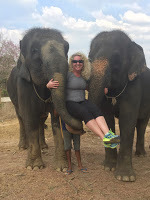 We topped off the day by riding elephants bareback along the banks of the Kwae Noi River. As we approached the lumbering beasts with bananas, their long trunks greeted us like groping hands. I climbed aboard Mayura, my ride for the day, straddling her neck with her coarse hair poking at my legs and her ears flapping against my hips. The trainer grunted and she sauntered forward to follow the other elephants, but every chance she got she stopped to eat, pulling up small trees and clumps of grass. The trainer dismounted and I sat atop of that great beast feeling completely out of control. I knew no commands. I had no bridle or saddle. I was keenly aware that had she wanted to, Mayura could have yanked me from her back with her trunk and ripped me limb from limb. Instead, she was content to pull saplings out of the ground from their roots and get me soaking wet in the river. I was a helpless passenger in this adventure into the unfamiliar.
We topped off the day by riding elephants bareback along the banks of the Kwae Noi River. As we approached the lumbering beasts with bananas, their long trunks greeted us like groping hands. I climbed aboard Mayura, my ride for the day, straddling her neck with her coarse hair poking at my legs and her ears flapping against my hips. The trainer grunted and she sauntered forward to follow the other elephants, but every chance she got she stopped to eat, pulling up small trees and clumps of grass. The trainer dismounted and I sat atop of that great beast feeling completely out of control. I knew no commands. I had no bridle or saddle. I was keenly aware that had she wanted to, Mayura could have yanked me from her back with her trunk and ripped me limb from limb. Instead, she was content to pull saplings out of the ground from their roots and get me soaking wet in the river. I was a helpless passenger in this adventure into the unfamiliar.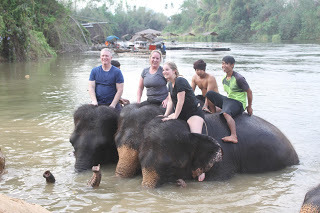 The next day we traded our four-legged transportation in for long-tail boats and tuk tuks (open air taxis powered by motorcycles) as we toured the sights of Bangkok. We visited several Buddhist temples as the oppressive heat beat down on us. We followed the masses through the opulent Grand Palace. We weaved in and out of gnarled traffic in the back of a tuk tuk and explored the city from a water taxi on the Chao Praya River before heading to the airport and our flight to Krabi. The mix of unfamiliar sights and sounds kept me off balance and intrigued me the entire time.
The next day we traded our four-legged transportation in for long-tail boats and tuk tuks (open air taxis powered by motorcycles) as we toured the sights of Bangkok. We visited several Buddhist temples as the oppressive heat beat down on us. We followed the masses through the opulent Grand Palace. We weaved in and out of gnarled traffic in the back of a tuk tuk and explored the city from a water taxi on the Chao Praya River before heading to the airport and our flight to Krabi. The mix of unfamiliar sights and sounds kept me off balance and intrigued me the entire time.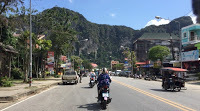 Riding in Ao NangOur first day in Krabi and Ao Nang began with a little slower pace. Our villas were nestled in the countryside away from all the hustle and bustle of the town. After breakfast we ventured into Ao Nang to stroll along the beach but found ourselves peppered by shop owners hawking their wares. The streets were filled with motorcycles and scooters creating a cacophony of revving two-cycle motors and the air smelled of lingering oily exhaust. Not wanting to be left out of the fun, we rented a couple of scooters for the afternoon and were soon dodging in and out of traffic along the beach on the wrong side of the road. By the end of an exhilarating afternoon cruising around on two wheels, I was starting to find my bearings, and we decided to rent them again the last few days of the trip.
Riding in Ao NangOur first day in Krabi and Ao Nang began with a little slower pace. Our villas were nestled in the countryside away from all the hustle and bustle of the town. After breakfast we ventured into Ao Nang to stroll along the beach but found ourselves peppered by shop owners hawking their wares. The streets were filled with motorcycles and scooters creating a cacophony of revving two-cycle motors and the air smelled of lingering oily exhaust. Not wanting to be left out of the fun, we rented a couple of scooters for the afternoon and were soon dodging in and out of traffic along the beach on the wrong side of the road. By the end of an exhilarating afternoon cruising around on two wheels, I was starting to find my bearings, and we decided to rent them again the last few days of the trip.
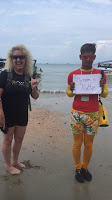 Britt with Natty
Britt with NattyWe thought we booked a private boattour across the Straits of Malacca to Phi Phi Island, but soon realized as our flatbed truck-cum-taxi filled up with people, that we were part of a bigger tour. After some heated and somewhat confusing negotiations, we cut the price in half for the tour and were assigned to Boat 21 and lined up on the beach to load up. Our guide, Natty, burst on the scene with great fanfare dressed like a banana with shorts on. His flamboyant delivery of instructions and coquetry kept us entertained as we island hopped our way to Phi Phi Island.
Unfortunately, the tour on Phi Phi Island was overcrowded and didn’t deliver the adventure experience we wanted, until the ride back to Ao Nang. On the way out that morning the water was smooth and the skies were clear, but when we started our return a squall line loomed on the horizon. The seas became rough and the wind whipped at our faces as we headed towards the storm. We were at the mercy of the capable Captain and his First Mate as we ploughed forward into the waves. I was sitting at the back of the boat with the sound of the two outboard motors pounding in my ears as the waves continued to build and crash over the side of the boat on top of me. Each time we crested a wave with the bow of the boat I got soaked in the back. For thirty minutes the warm water of the Indian Ocean pummeled me and soaked me through and through and I laughed a nervous laugh as we headed into the teeth of the afternoon shower. By the time we pulled into port, the rain was coming down in sheets, but we were all laughing at the thrill of the ride.
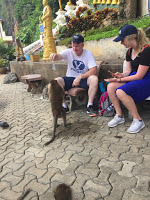 Monkeys at Tiger Cave TempleIt was foggy and cooler the next morning, but that was perfect weather for the next adventure—climbing 1237 uneven and steep steps to a Buddhist temple atop a limestone mountain. Tiger Cave Temple overlooks Krabi from the North and boasts incredible views of the surrounding geography, but you will pay a price for those views. My daughter wanted to race to the top, so we split off from the rest of the group and kept a grueling pace. We stopped for photos and to catch our breath, but made it to the top in about forty minutes covered in sweat. The breathtaking vistas made the climb worthwhile. I sat and took it all in as everyone else climbed to the top. As I sat enjoying the view, I met people from the Philippines, Malaysia, Germany, France, Canada, and Spain. I guess the desire to climb is universal and the risk was certainly worth the reward.
Monkeys at Tiger Cave TempleIt was foggy and cooler the next morning, but that was perfect weather for the next adventure—climbing 1237 uneven and steep steps to a Buddhist temple atop a limestone mountain. Tiger Cave Temple overlooks Krabi from the North and boasts incredible views of the surrounding geography, but you will pay a price for those views. My daughter wanted to race to the top, so we split off from the rest of the group and kept a grueling pace. We stopped for photos and to catch our breath, but made it to the top in about forty minutes covered in sweat. The breathtaking vistas made the climb worthwhile. I sat and took it all in as everyone else climbed to the top. As I sat enjoying the view, I met people from the Philippines, Malaysia, Germany, France, Canada, and Spain. I guess the desire to climb is universal and the risk was certainly worth the reward.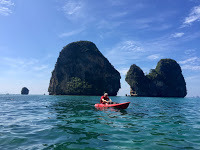
 The last day we rode our scooters back down to the beach and hopped a long tail boat over to Railay Beach. This gorgeous beach boasts white sand with the consistency of brown sugar, clear blue waters, and great kayaking. We kayaked out to the nearby limestone islands and explore the caves carved by the ocean. The lack of waves made for great kayaking, but monotonous beach time. After a few hours we headed back to Ao Nang and toured the area on the scooters enjoying the afternoon sun.
The last day we rode our scooters back down to the beach and hopped a long tail boat over to Railay Beach. This gorgeous beach boasts white sand with the consistency of brown sugar, clear blue waters, and great kayaking. We kayaked out to the nearby limestone islands and explore the caves carved by the ocean. The lack of waves made for great kayaking, but monotonous beach time. After a few hours we headed back to Ao Nang and toured the area on the scooters enjoying the afternoon sun.
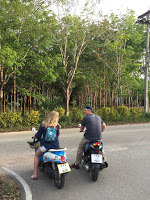 For our last dinner in country, we rode to a restaurant where we could watch the sunset. The view was spectacular, but like almost every other meal ordering food was an adventure in itself. When we finished, we hopped on the scooters in the dark for one more jaunt along the beachfront road. One more chance to take a risk and glean the reward of soaking in the sights and sounds of Thailand.
For our last dinner in country, we rode to a restaurant where we could watch the sunset. The view was spectacular, but like almost every other meal ordering food was an adventure in itself. When we finished, we hopped on the scooters in the dark for one more jaunt along the beachfront road. One more chance to take a risk and glean the reward of soaking in the sights and sounds of Thailand.The sound of metal crashing against metal made my heart skip a beat. My daughter, riding double with her friend, had gotten off balance during her start and crashed into two parked cycles. I pulled over and went running back to the accident. She had banged her ankle in the mash up, and they were both shaken a bit. I picked up the other bikes and examined them. They didn’t appear to have any damage. Her scooter had a broken headlight and damaged fairing. As I examined the rented scooter, a policeman came up and started taking notes. For a moment I regretted taking the risk of riding in a foreign country. I worried that my propensity for adventure might cost me more coin than I anticipated. Maybe I should stay home and watch TV like everybody else. Perhaps taking risks is not the smartest course of action when you are a long way from home and don’t speak the language.
With the help of a local hotel employee (Holiday Inn no less), we got it all sorted out. The other bikes were not damaged. No laws had been broken. Although my daughter and her passenger were shaken a bit, they had suffered only minor bruises. The only problem remaining was the cost of repairing the rented scooter. As my wife and daughter got one last massage, I solicited the help of a local shopkeeper and got an estimate on the repair. In the end the damage came to about $160, a small price to pay for the fun we had.
Yes, I like to take a few risks when I travel, probably too many risks. But the very nature of traveling is risky. We leave the safety of our home to visit places where we don’t understand the language, the culture, the food, and the customs not because we are looking for the familiar. No, we travel because we are looking for an adventure into the unfamiliar. I took a few risks while traveling in Thailand, but the trip certainly was a pleasant adventure into the unfamiliar that I will never forget.
 Railay Beach
Railay Beach
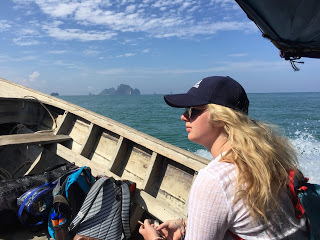 Rylee on her to Railay Beach
Rylee on her to Railay Beach
Published on April 05, 2017 12:20
March 6, 2017
Scared of Getting Old
My Dad used to say, “You can’t scare a man who ain’t afraid to die.” I don’t think I’m afraid of dying, but I must admit that I am afraid of getting old. Aging is an easy process. No matter what you do the clock keeps on ticking and with each passing second, we age. But aging without getting old is difficult. I don’t mind aging, but getting old scares me to death.
Every time I look in the mirror I see more wrinkles, more pronounced lines, and more gray hair. In fact when the stylist finished cutting my hair the other day she asked if I wanted hair gel in my hair. When I replied that I did, she looked around for a minute and said, “Let me get the gel that looks better in gray hair.” I guess that means I’m aging, or at least my hair is turning gray. I’m not ready to get old, but that doesn’t stop my biological clock from ticking away.
The problem with aging is that the person inside my body doesn’t know it. I still feel like I’m in my twenties or thirties (at least in my mind). I still think I can haul hay all day long, play tackle football, take a tumble from a horse, and any other laborious, or possibly injurious, activity. The truth is that I can still do all of those things, but the recovery time is about ten times longer than when I was younger. In my mind I don’t feel any different. My skills are essentially the same. My physical abilities are still pretty good. My desire to take on a bit of adventure is still strong. The difference is that my body isn’t capable of recovering from the aches, pains, or injuries of strenuous and taxing experiences. It takes me weeks instead of days for my body to put itself back into working order, and that is only if I take copious amounts of ibuprofen. My mind is still young and doesn’t want to accept the fact that my body is aging.
As I come to grip with my own gerontological journey, I realize that I am becoming the “crazy old man” I used to make fun of as a teenager. You all know some version of the crazy old man I’m talking about. The one who wears socks with sandals, Bermuda shorts, and a funny fishing hat as he sits in the local diner all morning ranting about the government and the sad state of society. (By the way, the root word for gerontology comes from the Greek word geront which means “old man” lol.) I find myself wanting to wear only long pants with an elastic waistband to hide my aging legs and cover my increasing paunch. I catch myself talking about the way things were when I was growing up. I hear myself say things like, “Kids these days…” about some random twenty-something punk with his hat on sideways. Yep. I am becoming that crazy old coot that teenagers laugh about, and ignore. Some days I fight the urge to become the crazy old man, and some days I embrace that persona.
Old people aren’t any smarter than young people, but they do have more experience. That experience speaks to them and guides them. Young people have no seasoned guide, no intuition, to carry them through difficult choices. They have no tingle in the hairs on the back of their necks warning them of danger. Their brains haven’t developed the ability to process large amounts of input in short order and produce a conclusion that manifests itself in the form of a hunch. Old people aren’t smarter, but they do have the advantage of experience, and that experience is worth all the exuberance of youth when it comes to making quick decisions.
Of course there are some other advantages to aging. Discounts. I often get asked if I want the senior discount and save lots of money on purchases. Time. I don’t waste time on things I know don’t work. I have made most of the big mistakes in life and I don’t waste any time on making them again. Emotion. I expend less emotional energy on things that don’t matter. I don’t get as angry as I used to. I don’t get as worried as I used to. I don’t get as stressed as I used to. I figure if the whole world goes to pot, I don’t have that long to live anyway and it doesn’t matter. Lust. The drums of lust don’t beat as loud as they used to, and I’m okay with that. I’m happy with who I am and what I’ve got. Spirituality. I don’t know if I feel more connected to God because I am closer to seeing Him again, or because I have seen a lifetime of His hand in my life, but the things of the unseen spiritual world have more impact on me now. Aging does have a few perks.
If I want to age without getting old, I must refuse to accept some of the negative things that come with getting old. I refuse to stop learning. I refuse to stop trying new things, as long as I can avoid injury. I refuse to become pessimistic about the future. I refuse to waste the time I have left on trivial things. I refuse to carry grudges or seek revenge. I refuse to spend all my time looking back at the past. I refuse to spend all of my time chasing a dollar bill. I refuse to look in the mirror and only see someone who is getting old. I will continue to live as long as I have breath, and I will fill each day with twenty-four hours of living (as long as I get to take a nap from time to time).
I think maybe you can scare a man who’s not afraid to die. I’m not afraid of dying, but getting old scares me death.
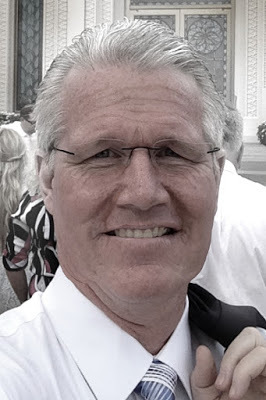 A projection of what I will look like in another 20 years
A projection of what I will look like in another 20 years
Every time I look in the mirror I see more wrinkles, more pronounced lines, and more gray hair. In fact when the stylist finished cutting my hair the other day she asked if I wanted hair gel in my hair. When I replied that I did, she looked around for a minute and said, “Let me get the gel that looks better in gray hair.” I guess that means I’m aging, or at least my hair is turning gray. I’m not ready to get old, but that doesn’t stop my biological clock from ticking away.
The problem with aging is that the person inside my body doesn’t know it. I still feel like I’m in my twenties or thirties (at least in my mind). I still think I can haul hay all day long, play tackle football, take a tumble from a horse, and any other laborious, or possibly injurious, activity. The truth is that I can still do all of those things, but the recovery time is about ten times longer than when I was younger. In my mind I don’t feel any different. My skills are essentially the same. My physical abilities are still pretty good. My desire to take on a bit of adventure is still strong. The difference is that my body isn’t capable of recovering from the aches, pains, or injuries of strenuous and taxing experiences. It takes me weeks instead of days for my body to put itself back into working order, and that is only if I take copious amounts of ibuprofen. My mind is still young and doesn’t want to accept the fact that my body is aging.
As I come to grip with my own gerontological journey, I realize that I am becoming the “crazy old man” I used to make fun of as a teenager. You all know some version of the crazy old man I’m talking about. The one who wears socks with sandals, Bermuda shorts, and a funny fishing hat as he sits in the local diner all morning ranting about the government and the sad state of society. (By the way, the root word for gerontology comes from the Greek word geront which means “old man” lol.) I find myself wanting to wear only long pants with an elastic waistband to hide my aging legs and cover my increasing paunch. I catch myself talking about the way things were when I was growing up. I hear myself say things like, “Kids these days…” about some random twenty-something punk with his hat on sideways. Yep. I am becoming that crazy old coot that teenagers laugh about, and ignore. Some days I fight the urge to become the crazy old man, and some days I embrace that persona.
Old people aren’t any smarter than young people, but they do have more experience. That experience speaks to them and guides them. Young people have no seasoned guide, no intuition, to carry them through difficult choices. They have no tingle in the hairs on the back of their necks warning them of danger. Their brains haven’t developed the ability to process large amounts of input in short order and produce a conclusion that manifests itself in the form of a hunch. Old people aren’t smarter, but they do have the advantage of experience, and that experience is worth all the exuberance of youth when it comes to making quick decisions.
Of course there are some other advantages to aging. Discounts. I often get asked if I want the senior discount and save lots of money on purchases. Time. I don’t waste time on things I know don’t work. I have made most of the big mistakes in life and I don’t waste any time on making them again. Emotion. I expend less emotional energy on things that don’t matter. I don’t get as angry as I used to. I don’t get as worried as I used to. I don’t get as stressed as I used to. I figure if the whole world goes to pot, I don’t have that long to live anyway and it doesn’t matter. Lust. The drums of lust don’t beat as loud as they used to, and I’m okay with that. I’m happy with who I am and what I’ve got. Spirituality. I don’t know if I feel more connected to God because I am closer to seeing Him again, or because I have seen a lifetime of His hand in my life, but the things of the unseen spiritual world have more impact on me now. Aging does have a few perks.
If I want to age without getting old, I must refuse to accept some of the negative things that come with getting old. I refuse to stop learning. I refuse to stop trying new things, as long as I can avoid injury. I refuse to become pessimistic about the future. I refuse to waste the time I have left on trivial things. I refuse to carry grudges or seek revenge. I refuse to spend all my time looking back at the past. I refuse to spend all of my time chasing a dollar bill. I refuse to look in the mirror and only see someone who is getting old. I will continue to live as long as I have breath, and I will fill each day with twenty-four hours of living (as long as I get to take a nap from time to time).
I think maybe you can scare a man who’s not afraid to die. I’m not afraid of dying, but getting old scares me death.
 A projection of what I will look like in another 20 years
A projection of what I will look like in another 20 years
Published on March 06, 2017 20:33
October 19, 2016
The End of the World Began With a Writer's Strike
When we look back in history at the beginning of the downfall of the United States of America, we will see that it all began with the writers’ strike in Hollywood.
Go ahead and scoff at that statement, but hear me out.
After the writer’s strike of 1988, TV producers began looking at alternatives for producing programing if and when the next strike came along. That alternative came in the form of Survivor and reality TV was born. Now all producers had to do was pull together a group of narcissistic fame seekers and put them on an island, in a house, or in a dating competition, add some contrived drama and BAM! —the viewing public lined up in droves to watch. Who needed a plot when you could watch someone get naked on an island and try to spear fish, or each other? Who needed to cast strong noble characters when you could ask for volunteers to compete in a singing competition and thousands lined up outside coliseums? Who needed a romantic setting when you could fly wooing couples around the world to exotic locations? Why pay for writers to actually write drama when you can put a bunch of housewives together and let the drama unfold? Writers became obsolete.
In 2001 when the next writers’ strike loomed, the Writers Guild had less leverage than in 1988. And the strike of 2007 pushed reality TV to the top of the charts. Our society ate it up. We longed to see the likes of Snooki or the Bachelor. We yearned to enter the world of ice-road truckers, crab fishermen, or doomsday preppers. Now TV is filled with self-absorbed characters looking to extend their fifteen minutes of fame and cash in through some flamboyant act of self-indulgence that attracts the public attention like a two-headed calf, or the Kardashians.
Reality TV was the beginning of the end of the world.
Since writers could not make a living producing actual stories with plot and characters, they began working in reality TV. Producers, directors, and writers all worked together to make “reality” TV more emotional, drama-laden, and bizarre. They encouraged conflict since they didn’t have a plot to thicken. They encouraged brash behavior since they had no characters to develop. They manipulated the dialogue since they weren’t required to produce any. In other words, reality TV isn’t real, but it appears to be, and that has the viewing public conditioned to believe anything they see on TV. The lines between fact and fiction became so blurred that we actually thought two people could fall in love while millions watched.
Fast forward to the election cycle of 2016. What did we get? We got possibly the two worst candidates in US history. Why? Because the public longed for more reality TV and these two candidates provided more material than anything the viewing public had seen to date: clandestine (and illegal) email servers, claims of sexual misconduct, violence at rallies (intentionally promoted and fostered by the way), shouting matches, secret meetings on airplanes, third-grade name calling, secret deaths, political spies, moles, and hidden tax returns. As the campaign unfolded candidates stood on the moral high ground the size of an anthill and hurled disparaging tweets at each other. The viewing public stood on that same moral high ground and snapchatted about the need for a third candidate. It was a reality TV bonanza! Unfortunately, the results of this season’s voting has more serious consequences than a record deal.
Reality TV conditioned us to accept whatever we saw on TV as reality. We no longer have the ability to discern between fact and fiction. We no longer look for a moral deeper than who gets the most votes. We lost our ability to guess the culprit in a mystery, or unravel a tightly woven plot. We have been reduced to spoon-fed entertainment and spoon-fed information. We are no longer capable of eating the solid foods of individual thought or critical thinking. We just want to know what the Kardashians are wearing.
Yes, reality TV made us easy to manipulate and control. When the 2016 election cycle began, we got front-row seats to the biggest reality TV show of them all—the biggest losers—and we voted for them.
Don’t mess with writers. They will destroy you.
Go ahead and scoff at that statement, but hear me out.
After the writer’s strike of 1988, TV producers began looking at alternatives for producing programing if and when the next strike came along. That alternative came in the form of Survivor and reality TV was born. Now all producers had to do was pull together a group of narcissistic fame seekers and put them on an island, in a house, or in a dating competition, add some contrived drama and BAM! —the viewing public lined up in droves to watch. Who needed a plot when you could watch someone get naked on an island and try to spear fish, or each other? Who needed to cast strong noble characters when you could ask for volunteers to compete in a singing competition and thousands lined up outside coliseums? Who needed a romantic setting when you could fly wooing couples around the world to exotic locations? Why pay for writers to actually write drama when you can put a bunch of housewives together and let the drama unfold? Writers became obsolete.
In 2001 when the next writers’ strike loomed, the Writers Guild had less leverage than in 1988. And the strike of 2007 pushed reality TV to the top of the charts. Our society ate it up. We longed to see the likes of Snooki or the Bachelor. We yearned to enter the world of ice-road truckers, crab fishermen, or doomsday preppers. Now TV is filled with self-absorbed characters looking to extend their fifteen minutes of fame and cash in through some flamboyant act of self-indulgence that attracts the public attention like a two-headed calf, or the Kardashians.
Reality TV was the beginning of the end of the world.
Since writers could not make a living producing actual stories with plot and characters, they began working in reality TV. Producers, directors, and writers all worked together to make “reality” TV more emotional, drama-laden, and bizarre. They encouraged conflict since they didn’t have a plot to thicken. They encouraged brash behavior since they had no characters to develop. They manipulated the dialogue since they weren’t required to produce any. In other words, reality TV isn’t real, but it appears to be, and that has the viewing public conditioned to believe anything they see on TV. The lines between fact and fiction became so blurred that we actually thought two people could fall in love while millions watched.
Fast forward to the election cycle of 2016. What did we get? We got possibly the two worst candidates in US history. Why? Because the public longed for more reality TV and these two candidates provided more material than anything the viewing public had seen to date: clandestine (and illegal) email servers, claims of sexual misconduct, violence at rallies (intentionally promoted and fostered by the way), shouting matches, secret meetings on airplanes, third-grade name calling, secret deaths, political spies, moles, and hidden tax returns. As the campaign unfolded candidates stood on the moral high ground the size of an anthill and hurled disparaging tweets at each other. The viewing public stood on that same moral high ground and snapchatted about the need for a third candidate. It was a reality TV bonanza! Unfortunately, the results of this season’s voting has more serious consequences than a record deal.
Reality TV conditioned us to accept whatever we saw on TV as reality. We no longer have the ability to discern between fact and fiction. We no longer look for a moral deeper than who gets the most votes. We lost our ability to guess the culprit in a mystery, or unravel a tightly woven plot. We have been reduced to spoon-fed entertainment and spoon-fed information. We are no longer capable of eating the solid foods of individual thought or critical thinking. We just want to know what the Kardashians are wearing.
Yes, reality TV made us easy to manipulate and control. When the 2016 election cycle began, we got front-row seats to the biggest reality TV show of them all—the biggest losers—and we voted for them.
Don’t mess with writers. They will destroy you.
Published on October 19, 2016 10:23
September 18, 2016
Finding Mount Zion
I watched the dawn burst across the dark morning sky from the seat of my motorcycle and wondered how the day would go. Would I enjoy the trip? Would the weather be good? Would I finish it without any mechanical problems and without accident? Would we make it to Zion? Would I make it to see my new grandson?
Zion is an interesting word full of symbolism. Originally it was a mountain outside of Jerusalem, but over the years the word has taken on the meaning of a utopian society where everyone lives in peace and cares for each other both spiritually and temporally. Several religious groups seek to establish “Zion” where their followers can be free from the toil and trouble of the world. My goal for the day was not so lofty. I simply wanted to ride trouble free from Gilbert, AZ, to Zion National Park in Southern Utah, and then on to Provo, Utah, the next day.
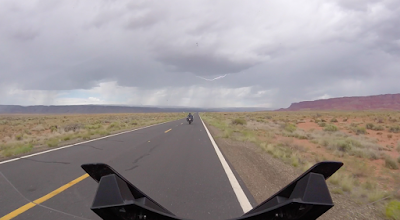 Riding into the storm with lightning in the cloudsI met up with Tom and Tim, two of my riding buddies, and we headed northbound watching the sun come up over the mountains. As we climbed in elevation, I listened to the playlist of 80’s music my daughter helped me put together the night before. Back in the day when I was listening to those songs, the world was full of gloom and doom—the Cold War, hostages in Iran, nuclear winter, etc. I never expected my life to turn out as good as it has. Lately, however, I feel like the best days are behind me. It’s a nagging feeling that lurks in the back of my head like some dirty thought I have disciplined into the recesses of my mind in an attempt to remain virtuous and can’t seem to shake. Tomorrow doesn’t hold the promise that it used to, but today I am on my motorcycle climbing a winding mountain road watching the sunrise with friends. I have been blessed.
Riding into the storm with lightning in the cloudsI met up with Tom and Tim, two of my riding buddies, and we headed northbound watching the sun come up over the mountains. As we climbed in elevation, I listened to the playlist of 80’s music my daughter helped me put together the night before. Back in the day when I was listening to those songs, the world was full of gloom and doom—the Cold War, hostages in Iran, nuclear winter, etc. I never expected my life to turn out as good as it has. Lately, however, I feel like the best days are behind me. It’s a nagging feeling that lurks in the back of my head like some dirty thought I have disciplined into the recesses of my mind in an attempt to remain virtuous and can’t seem to shake. Tomorrow doesn’t hold the promise that it used to, but today I am on my motorcycle climbing a winding mountain road watching the sunrise with friends. I have been blessed.
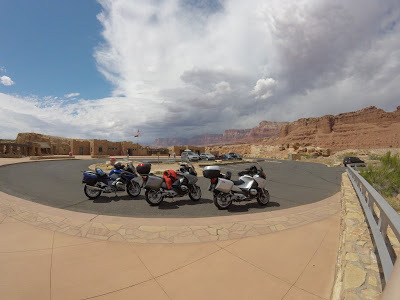 Three BMW R1200 RT motorcycles without riders
Three BMW R1200 RT motorcycles without riders
My grandson is inheriting a less than perfect world. Zion is still just some ethereal place longed for by the faithful. The world is still full of conflict, trouble, and despair. I hope he gets to experience some of the great things I have experienced and that his life will be better than mine. I hope the world he inherits from my generation is a better place than the world I inherited, but when I watch the news I can tell that our world is still a long way from Zion. Maybe Zion will be possible in his lifetime.
Riding motorcycles is risky, but that’s part of the enjoyment. Having a baby is also risky. Women shake hands with the Grim Reaper to bring a child into this world. Sometimes the Grim Reaper wants more than a handshake, and women have to slap him across the face. Only a mother can understand what if feels like to stare death in the face in order to produce life. Only a mother understands the physical cost of delivering a child. Thankfully, we all benefit from a mother’s risky endeavor and enjoy the fruits of her labor. Each child renews our hope that tomorrow will be better than today.
We traversed mountains, crossed the painted desert, and endured an afternoon thundershower, but we arrived at Zion National Park without accident or incident. The towering canyons of painted rocks against a blue sky reminded me of majestic temples. Man may build tall towers and broad domes, but God’s works of architecture are unrivaled.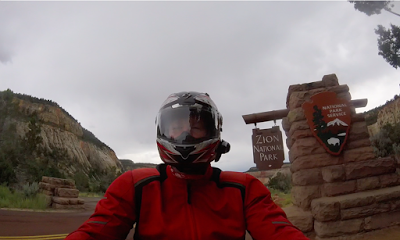 Zion motorcycle selfieAfter a long day of riding we enjoyed dinner (topped off with pie) and headed to bed. My riding buddies were traveling in different directions the next day. I would be traveling solo to meet my grandson.
Zion motorcycle selfieAfter a long day of riding we enjoyed dinner (topped off with pie) and headed to bed. My riding buddies were traveling in different directions the next day. I would be traveling solo to meet my grandson.
A thunderclap woke me up at 0454. I could hear the rain pelting the windows and checked the radar. The only storm in Utah was right over my head. Fortunately, I had recently purchased some good rain gear, and now my ounce of prevention was worth a pound of cure. By 0600 the worst of the rain had passed and I climbed on my bike in the dark. Tom waved at me from his hotel window as I pulled out of the parking lot and rode off into the storm. I had an appointment to meet my first grandson, and was determined not to let a little rain stop me. However, I must admit that I took things a bit slower than usual, especially when I passed flashing signs warning of deer. Would I make it without incident or accident? Would meeting my first grandson be all that I hoped it would be?
As I rode, I wondered how I was supposed to feel about being a grandfather. Everyone tells me that being a grandparent is the best thing ever. My friends say it’s much better than being a parent, or that grandkids are the payback for all the struggles as a parent. I knew my wife was giddy, but I wasn’t sure how I felt.
I can honestly say that being a father is the best thing I have ever done. It has brought me more joy and happiness than I ever expected. It has stretched me in ways I never knew possible. As a father, my emotions have ranged between the extremes—worry, fear, elation, joy, impatience, frustration, anger, and yes, happiness beyond compare. I was afraid that being a grandfather might somehow diminish the greatest experience of my entire life. I didn’t want to adopt some cynical attitude about my struggles as a father because being a grandfather was so much better. I wanted it to add to my joy, not diminish the struggle, or joy, of fatherhood.
The rain subsided and the sky burned with streaks of red, yellow, and orange as the sun came up. I wasted no time and only stopped when I needed gas or a bathroom break (which is more often than I like as I get older). Somewhere overhead my wife was flying to Salt Lake City, and I needed to arrive around the same time she did. Fortunately, I didn’t hit any of the deer the flashing signs warned me about.
I arrived ahead of schedule and traded the thrill of the motorcycle for the safety of a rental car. When we pulled up to my son’s small basement apartment, my wife was so excited that she jumped out of the car before it stopped rolling. I took a deep breath and tried not to let my emotions get away from me. I was holding it all in. How would I feel when I held my grandson? Would it be everything my friends told me it would be? Would I take one look at that beautiful baby and suddenly have disdain for my parental journey thus far? Would I mock the years of struggle, the frustrating nights, and the moments of sheer joy that fatherhood had brought me?
I entered the apartment and found my grandson doing what newborn babies do—crying, eating, sleeping, and filling diapers. I washed my hands and waited my turn to hold him. When my daughter-in-law put him in my arms, all my fears melted away. I found myself transported back to my early years as a father pacing the floor with a crying baby and worrying how I was going to provide for all his or her needs, but when I looked up at my grown son and his wife, the sting of worry melted away.
 I suddenly got it. Being a grandparent is awesome because your children have taken over the burden of the parental struggle. Grandparents are there to love, support, and spoil. My years as a parental happiness had not ended. They had just been multiplied. I smiled and relaxed.
I suddenly got it. Being a grandparent is awesome because your children have taken over the burden of the parental struggle. Grandparents are there to love, support, and spoil. My years as a parental happiness had not ended. They had just been multiplied. I smiled and relaxed.
Zion is a mountain because we only find happiness in worthwhile struggle. Being a parent is the greatest, most rewarding struggle of all. A newborn baby reminds us that tomorrow still holds as great a promise as yesterday. I had set out in search of Zion, that mythical place of enduring happiness, but the journey had not been an easy one. As I held my grandson, I knew that I had found it.
 Escalante Staircase
Escalante Staircase
Zion is an interesting word full of symbolism. Originally it was a mountain outside of Jerusalem, but over the years the word has taken on the meaning of a utopian society where everyone lives in peace and cares for each other both spiritually and temporally. Several religious groups seek to establish “Zion” where their followers can be free from the toil and trouble of the world. My goal for the day was not so lofty. I simply wanted to ride trouble free from Gilbert, AZ, to Zion National Park in Southern Utah, and then on to Provo, Utah, the next day.
 Riding into the storm with lightning in the cloudsI met up with Tom and Tim, two of my riding buddies, and we headed northbound watching the sun come up over the mountains. As we climbed in elevation, I listened to the playlist of 80’s music my daughter helped me put together the night before. Back in the day when I was listening to those songs, the world was full of gloom and doom—the Cold War, hostages in Iran, nuclear winter, etc. I never expected my life to turn out as good as it has. Lately, however, I feel like the best days are behind me. It’s a nagging feeling that lurks in the back of my head like some dirty thought I have disciplined into the recesses of my mind in an attempt to remain virtuous and can’t seem to shake. Tomorrow doesn’t hold the promise that it used to, but today I am on my motorcycle climbing a winding mountain road watching the sunrise with friends. I have been blessed.
Riding into the storm with lightning in the cloudsI met up with Tom and Tim, two of my riding buddies, and we headed northbound watching the sun come up over the mountains. As we climbed in elevation, I listened to the playlist of 80’s music my daughter helped me put together the night before. Back in the day when I was listening to those songs, the world was full of gloom and doom—the Cold War, hostages in Iran, nuclear winter, etc. I never expected my life to turn out as good as it has. Lately, however, I feel like the best days are behind me. It’s a nagging feeling that lurks in the back of my head like some dirty thought I have disciplined into the recesses of my mind in an attempt to remain virtuous and can’t seem to shake. Tomorrow doesn’t hold the promise that it used to, but today I am on my motorcycle climbing a winding mountain road watching the sunrise with friends. I have been blessed.
 Three BMW R1200 RT motorcycles without riders
Three BMW R1200 RT motorcycles without ridersMy grandson is inheriting a less than perfect world. Zion is still just some ethereal place longed for by the faithful. The world is still full of conflict, trouble, and despair. I hope he gets to experience some of the great things I have experienced and that his life will be better than mine. I hope the world he inherits from my generation is a better place than the world I inherited, but when I watch the news I can tell that our world is still a long way from Zion. Maybe Zion will be possible in his lifetime.
Riding motorcycles is risky, but that’s part of the enjoyment. Having a baby is also risky. Women shake hands with the Grim Reaper to bring a child into this world. Sometimes the Grim Reaper wants more than a handshake, and women have to slap him across the face. Only a mother can understand what if feels like to stare death in the face in order to produce life. Only a mother understands the physical cost of delivering a child. Thankfully, we all benefit from a mother’s risky endeavor and enjoy the fruits of her labor. Each child renews our hope that tomorrow will be better than today.
We traversed mountains, crossed the painted desert, and endured an afternoon thundershower, but we arrived at Zion National Park without accident or incident. The towering canyons of painted rocks against a blue sky reminded me of majestic temples. Man may build tall towers and broad domes, but God’s works of architecture are unrivaled.
 Zion motorcycle selfieAfter a long day of riding we enjoyed dinner (topped off with pie) and headed to bed. My riding buddies were traveling in different directions the next day. I would be traveling solo to meet my grandson.
Zion motorcycle selfieAfter a long day of riding we enjoyed dinner (topped off with pie) and headed to bed. My riding buddies were traveling in different directions the next day. I would be traveling solo to meet my grandson.A thunderclap woke me up at 0454. I could hear the rain pelting the windows and checked the radar. The only storm in Utah was right over my head. Fortunately, I had recently purchased some good rain gear, and now my ounce of prevention was worth a pound of cure. By 0600 the worst of the rain had passed and I climbed on my bike in the dark. Tom waved at me from his hotel window as I pulled out of the parking lot and rode off into the storm. I had an appointment to meet my first grandson, and was determined not to let a little rain stop me. However, I must admit that I took things a bit slower than usual, especially when I passed flashing signs warning of deer. Would I make it without incident or accident? Would meeting my first grandson be all that I hoped it would be?
As I rode, I wondered how I was supposed to feel about being a grandfather. Everyone tells me that being a grandparent is the best thing ever. My friends say it’s much better than being a parent, or that grandkids are the payback for all the struggles as a parent. I knew my wife was giddy, but I wasn’t sure how I felt.
I can honestly say that being a father is the best thing I have ever done. It has brought me more joy and happiness than I ever expected. It has stretched me in ways I never knew possible. As a father, my emotions have ranged between the extremes—worry, fear, elation, joy, impatience, frustration, anger, and yes, happiness beyond compare. I was afraid that being a grandfather might somehow diminish the greatest experience of my entire life. I didn’t want to adopt some cynical attitude about my struggles as a father because being a grandfather was so much better. I wanted it to add to my joy, not diminish the struggle, or joy, of fatherhood.
The rain subsided and the sky burned with streaks of red, yellow, and orange as the sun came up. I wasted no time and only stopped when I needed gas or a bathroom break (which is more often than I like as I get older). Somewhere overhead my wife was flying to Salt Lake City, and I needed to arrive around the same time she did. Fortunately, I didn’t hit any of the deer the flashing signs warned me about.
I arrived ahead of schedule and traded the thrill of the motorcycle for the safety of a rental car. When we pulled up to my son’s small basement apartment, my wife was so excited that she jumped out of the car before it stopped rolling. I took a deep breath and tried not to let my emotions get away from me. I was holding it all in. How would I feel when I held my grandson? Would it be everything my friends told me it would be? Would I take one look at that beautiful baby and suddenly have disdain for my parental journey thus far? Would I mock the years of struggle, the frustrating nights, and the moments of sheer joy that fatherhood had brought me?
I entered the apartment and found my grandson doing what newborn babies do—crying, eating, sleeping, and filling diapers. I washed my hands and waited my turn to hold him. When my daughter-in-law put him in my arms, all my fears melted away. I found myself transported back to my early years as a father pacing the floor with a crying baby and worrying how I was going to provide for all his or her needs, but when I looked up at my grown son and his wife, the sting of worry melted away.
 I suddenly got it. Being a grandparent is awesome because your children have taken over the burden of the parental struggle. Grandparents are there to love, support, and spoil. My years as a parental happiness had not ended. They had just been multiplied. I smiled and relaxed.
I suddenly got it. Being a grandparent is awesome because your children have taken over the burden of the parental struggle. Grandparents are there to love, support, and spoil. My years as a parental happiness had not ended. They had just been multiplied. I smiled and relaxed.Zion is a mountain because we only find happiness in worthwhile struggle. Being a parent is the greatest, most rewarding struggle of all. A newborn baby reminds us that tomorrow still holds as great a promise as yesterday. I had set out in search of Zion, that mythical place of enduring happiness, but the journey had not been an easy one. As I held my grandson, I knew that I had found it.
 Escalante Staircase
Escalante Staircase
Published on September 18, 2016 09:51
September 9, 2016
Riding With Nutnfancy
Back in the day I needed to ask a hot girl out to the AFROTC Dining Out (a formal military dinner), but I wanted to do it with pizazz. Having watched my six teenagers over the years I know that nobody these days picks up the phone to ask someone out on a date to the big dance. They all do something special like drop off a poster with candy glued to it and some cute saying to ask out their date. Back in the day, we really didn’t do that. However, I really had the hots for this girl, and I wanted to make a statement.
My buddy was a year behind me in AFROTC and in charge of the Honor Guard. He was one of the most squared-away troops I knew. On top of that, he had a sword. So I hatched a plan. I offered him, and a few of the other Honor Guard members, pizza if they would go over in their uniforms (complete with the drill rifles and the sword) and ask out this hottie to the Dining Out on my behalf.
When they knocked on the door with the sword drawn, it got everyone’s attention in the apartment complex. With a crowd of young ladies looking on, my buddy delivered the invite with perfect military precision and bearing. He barked out commands. The sword flashed. Rifles twirled. Heels clicked together. The invite was delivered in perfect military fashion.
How can you refuse a man in uniform with a sword? She said yes.
Fast forward almost thirty years. My buddy and I finished our military careers. We both pursued post military goals. We both had families. We both got back in to motorcycles. We both got gray hairs and put on a few pounds. I was going to be in his neck of the woods riding my motorcycle, so I gave him a shout and asked if he could lead me on one of his favorite local rides. He accepted. The night before the ride he sent me a text with a time and coordinates.
The next morning greeted me with a clear blue sky and cool temperatures. I geared up and left the condo early. I pulled off the highway and looked at my map to confirm my position, but before I could get the map pulled up on my phone I saw my buddy riding up on his KTM decked out in high visibility gear. He pulled up beside me, opened up his modular helmet, and gave me a long once over. “It’s good to ride with someone who knows how to find coordinates and be on time,” he said with a grin. “Nice gear too.” Then he proceeded to give me full safety briefing on his riding style, signaling, and hazards of the road we were taking. I knew right then that I was in good hands.
The ride was an alpine loop combining crowded four-lane highway and a small mountain road without any striping. I followed him through traffic and then through the hairpin turns and switchbacks of the deserted mountain road. He was fun to follow and he pushed me to improve my riding performance. As we rode we talked via Bluetooth headsets. He caught me up on his family. I caught him up on mine. We talked about riding, flying, and our common faith. Then he told me he had started a YouTube channel on the side—Nutnfancy. It was doing pretty well and he enjoyed it. Just like all those years ago in AFROTC, he was still the same squared-away guy going above and beyond the average Joe. He was still living life with a touch of pizazz.
I enjoyed riding with him and catching up after all these years. I’m a better rider because of it. He reminded me that it only takes a little more effort to be prepared, squared-away, and above average. He showed me what it means to manage high risk without sacrificing safety, or fun.
I still remember how he impressed that bombshell blonde all those years ago. She said yes to the Dining Out, but she also said yes when I asked her to marry me. I guess I owe my buddy another pizza.
Until next time Nutnfancy… I’ll buy lunch.
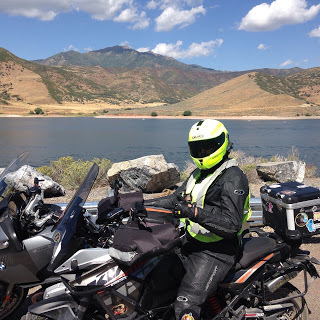
My buddy was a year behind me in AFROTC and in charge of the Honor Guard. He was one of the most squared-away troops I knew. On top of that, he had a sword. So I hatched a plan. I offered him, and a few of the other Honor Guard members, pizza if they would go over in their uniforms (complete with the drill rifles and the sword) and ask out this hottie to the Dining Out on my behalf.
When they knocked on the door with the sword drawn, it got everyone’s attention in the apartment complex. With a crowd of young ladies looking on, my buddy delivered the invite with perfect military precision and bearing. He barked out commands. The sword flashed. Rifles twirled. Heels clicked together. The invite was delivered in perfect military fashion.
How can you refuse a man in uniform with a sword? She said yes.
Fast forward almost thirty years. My buddy and I finished our military careers. We both pursued post military goals. We both had families. We both got back in to motorcycles. We both got gray hairs and put on a few pounds. I was going to be in his neck of the woods riding my motorcycle, so I gave him a shout and asked if he could lead me on one of his favorite local rides. He accepted. The night before the ride he sent me a text with a time and coordinates.
The next morning greeted me with a clear blue sky and cool temperatures. I geared up and left the condo early. I pulled off the highway and looked at my map to confirm my position, but before I could get the map pulled up on my phone I saw my buddy riding up on his KTM decked out in high visibility gear. He pulled up beside me, opened up his modular helmet, and gave me a long once over. “It’s good to ride with someone who knows how to find coordinates and be on time,” he said with a grin. “Nice gear too.” Then he proceeded to give me full safety briefing on his riding style, signaling, and hazards of the road we were taking. I knew right then that I was in good hands.
The ride was an alpine loop combining crowded four-lane highway and a small mountain road without any striping. I followed him through traffic and then through the hairpin turns and switchbacks of the deserted mountain road. He was fun to follow and he pushed me to improve my riding performance. As we rode we talked via Bluetooth headsets. He caught me up on his family. I caught him up on mine. We talked about riding, flying, and our common faith. Then he told me he had started a YouTube channel on the side—Nutnfancy. It was doing pretty well and he enjoyed it. Just like all those years ago in AFROTC, he was still the same squared-away guy going above and beyond the average Joe. He was still living life with a touch of pizazz.
I enjoyed riding with him and catching up after all these years. I’m a better rider because of it. He reminded me that it only takes a little more effort to be prepared, squared-away, and above average. He showed me what it means to manage high risk without sacrificing safety, or fun.
I still remember how he impressed that bombshell blonde all those years ago. She said yes to the Dining Out, but she also said yes when I asked her to marry me. I guess I owe my buddy another pizza.
Until next time Nutnfancy… I’ll buy lunch.

Published on September 09, 2016 17:00
August 19, 2016
Want to Make Better Decisions? Train Like a Pilot
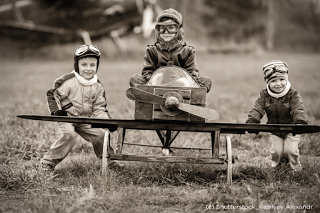
What does a good decision look like?
History is littered with infamous bad decisions. The Donner party took a shortcut. The Titanic launched without enough lifeboats. Engineers chose to fill the Hindenburg with flammable hydrogen gas. Each bad decision seemed like a good idea at the time. Hindsight is 20/20, but how can you tell the difference between a good and bad decision before it becomes history?
We often learn more from bad decisions than we do from good decisions, but learning from bad decisions is high risk, and the results can be catastrophic. Take the decision to jump off of a tall building with nothing but a beach towel as a parachute. The risk of an unsuccessful outcome is enormous, and failure leaves no room for a repeat attempt. We can learn from a bad decision, if we survive it.
 Aircraft Crash in Taiwan
Aircraft Crash in TaiwanCan we learn to make good decisions in advance and glean the experience of bad decisions without incurring all the risk? Yes!
According to the Aviation Safety Network, 2015 was the safest year in the history of air travel. (http://news.aviation-safety.net/2016/01/01/despite-high-profile-accidents-2015-was-the-safest-year-ever-according-to-asn-data/) We have come a long way since the 1970s when several thousand people were killed each year in air travel. Multiple factors have contributed to the improvement in air safety—better maintenance, better airplanes, better pilots—but perhaps the most significant improvements were made in aviation training. Air travel is safer because of better training, and training is better primarily because of improved simulation tools and techniques.
If you want to make better decisions, train like pilots do.
Aviation is not inherently dangerous, but it can be unforgiving of error and the results of error can be catastrophic. Yet, successful aviators cannot gain the skills necessary to succeed without trial and error. To develop good airmanship, pilots must exercise bad airmanship and live to tell about it. Pilots become better by surviving their mistakes. It is an effective way of learning, but risky, inefficient, and costly.
To solve this problem, Edwin Link, a barnstorming pilot of the 1920s, invented and patented the first flight simulator—The Pilot Maker—in 1929. Flight schools weren’t interested at first and his invention ended up as a carnival ride, but when WWII began the military employed his simulators to increase the survival rate of their student pilots. (http://www.nationalaviation.org/link-edwin/) Simulation has been a hallmark of aviation ever since.
Can we apply these same training techniques used to make pilots safer in other areas such as business, sports, or families? Yes.
Successful leaders in any field can teach the principles of good decision making using three basic simulation tools: 1)Historical simulation 2)Role playing 3)Risk-free or reduced-risk execution.
Aviators love to sit around and tell harrowing stories of survival. It may seem like a simple ego-building exercise in braggadocio, but in fact the stories serve a very important purpose. They convey hard-earned knowledge to other aviators and allow them to learn from someone else’s experience. This experiential storytelling is a type of historical simulation. Listeners can put themselves into the story and learn the same lesson without the dangers or the risks.
Historical simulation can take on other forms such as Monday-morning quarterbacking, case studies, and accident investigations. Decisions can be reviewed, analyzed, and learned from without the risk of personal failure. Furthermore, information conveyed in the form of a story is more likely to be remembered. With additional resources, successful, and unsuccessful, events can be converted into full-blown simulation to convey historical knowledge effectively.
Do you take time to mentor the up-and-coming leaders of your organization by sharing your personal experiences of success and failure? Do you encourage your leaders to learn from the mistakes of others through open communication? Do you review performance and debrief good and bad decisions so that everyone can learn? Historical simulation can be a powerful tool for improving decision-making.
Role-playing is an inexpensive and risk-free form of simulation that can be used effectively in a variety of situations. The US military has been using role-playing scenarios for over fifty years to train its pilots. During the rigorous training to earn their wings, pilots are subjected to scenario-based emergency training that tests both the nerves and knowledge of the pilot trainee. They are given an emergency situation that requires a prescribed course of action and then asked to talk their way through the resolution of the emergency step-by-step to a logical, and procedurally correct, conclusion. To simulate the stress that the actual emergency situation might cause, this is often done in front of their peers, with the threat of being grounded for the day if they don’t handle it correctly. Effective? Yes. Risk-free? Yes. (For more about scenario-based training in aviation visit FAA.gov.)
The use of role-playing can take on several forms from simple one-on-one training, group discussions, or even expanded scenario-based training simulations. This allows all the participants to put themselves into character and experience the teaching moment without the actual risk of failure (other than perhaps embarrassment with peers for poor performance). It allows participants to experience a problem from a specific point of view and develop an understanding of the problem and solution from a variety of viewpoints, thus increasing, and perhaps more importantly, personalizing their experience and knowledge.
Do you use role-playing exercises to train and teach your team? Can you think of an experience (personal or historical) that would make an effective scenario for everyone to learn from in a role-playing exercise? Effective role-playing can allow us to learn the lessons of a failure, or success, without risk.
In spite of our best efforts to prepare someone to make decisions, we cannot eliminate all the risk in the learning process. However simulation can provide learning options that are free from the risk of bodily harm. Edwin Link’s Pilot Maker did just that. A potential pilot could practice decision-making, execution of procedure, and manipulation of controls without risking life and limb. Modern-day simulation elevates the experience to such an advanced level that landings performed in the modern simulator are recognized by the FAA to validate landing currency. A pilot can perform a variety of emergency procedures in the simulator, and the only risk incurred is that of failure to advance in training. Advanced simulation can provide a risk-free learning experience.
 Modern Aircraft SimulatorIf simulation is not available or impractical, provide side-by-side mentoring to reduce the risk in learning. Aircraft with dual controls provide student pilots the opportunity to fly the airplane with an experienced instructor ready to take control when the risk becomes too great. The instructor can also demonstrate each maneuver, and save them both from harm. The learning process involves numerous transfers of aircraft control as the student pilot struggles to manipulate the aircraft. Flying with an instructor provides a reduced-risk option for learning to fly.
Modern Aircraft SimulatorIf simulation is not available or impractical, provide side-by-side mentoring to reduce the risk in learning. Aircraft with dual controls provide student pilots the opportunity to fly the airplane with an experienced instructor ready to take control when the risk becomes too great. The instructor can also demonstrate each maneuver, and save them both from harm. The learning process involves numerous transfers of aircraft control as the student pilot struggles to manipulate the aircraft. Flying with an instructor provides a reduced-risk option for learning to fly.What risk-free or reduced-risk training opportunities do you provide for your team? Is simulation available for training dangerous or difficult tasks risk-free? Can you reduce the risk of the learning process with side-by-side mentoring? Simulation and mentoring make learning more effective while reducing the risks of the learning process.
How do we learn to make good decisions? Can we capitalize on the historic lessons of bad decisions? Can we achieve the benefits of experience while avoiding the risks? We can do all these things, if we employ some of the tools that made 2015 the safest year in commercial aviation—1)Historical simulation 2)Role playing 3)Risk-free or reduced-risk execution.
If you want to make better decisions, train like pilots do.

Published on August 19, 2016 20:25



